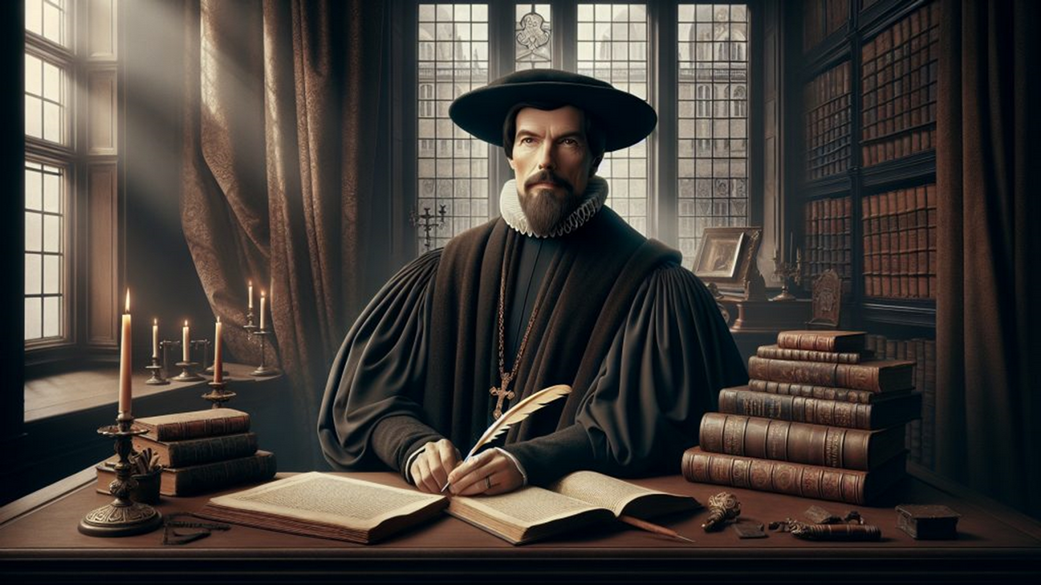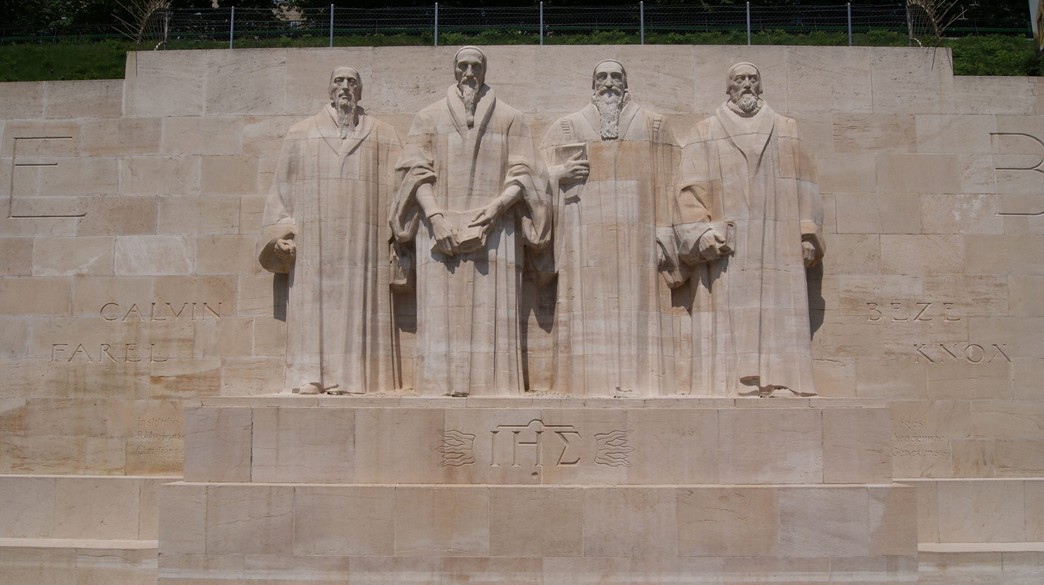Reformation Series: John Calvin
Introduction
Good morning. Last week was quite cold. On Thursday morning, I found the grass covered with frost, and the heater in the house was running. I hope you all stayed warm.
Before I begin, I need to remind you not to park in the private parking lot across the street from the church playground. Last Tuesday, the session discussed the offer from the owner of that building—to rent the parking lot for $200 per Sunday—and decided not to accept it. So the available parking areas include the church parking, the Lebanon Reporter parking, the Insurance parking, the County Courts parking, and street parking. Please be careful not to park in the problematic parking lot or at Airy Time.
As announced in the Midweek and during today’s announcements, we begin celebrating the Reformation today, which is one week earlier than usual due to my vacation next Sunday. Many people think that October 31st is only Halloween, but it is also Reformation Day, when Martin Luther nailed his 95 theses to the church door. Last year, Scot Hutcheson performed a monologue as Martin Luther. He did a wonderful job. This year, the worship team and I have planned a series introducing major reformers. We’ve heard a lot about Martin Luther, John Knox, and other famous reformers, but we don’t really know much about them. So we are going to spend four Sundays introducing each reformer—John Calvin, John Knox, Martin Luther, and Jan Hus. Today, instead of discussing Calvin’s theology, I am going to introduce the person of John Calvin, the single most important figure to all Presbyterians around the world.
A Life Shaped by God’s Sovereign Call
John Calvin was born on July 10th, 1509, in the small town of Noyon in northern France, about 60 miles from Paris. His family was part of the rising middle class. Calvin’s father was a lawyer who held important positions in the local Catholic Church. His mother died when he was young, but her piety left a lasting impression on him. It was clear from an early age that Calvin was exceptionally gifted academically, and his father sought the best education for him. Originally, his father intended for him to enter the priesthood, a common career path for educated men at the time. John Calvin began his education at the University of Paris, where he studied theology, Latin, and the humanities. The intellectual environment of Paris was vibrant with humanist ideas, particularly those of Erasmus, who called for a return to the classical sources of Christian thought, especially the Bible.
In a surprising turn of events, Calvin’s father changed his mind and directed him to study law instead. Calvin moved to Orléans and later to Bourges, where he received rigorous legal training. However, during this time, his heart and mind were increasingly drawn to the burgeoning Reformation movement. France, under King Francis I, was officially Catholic, but many intellectuals were quietly exploring ideas of reform, especially the teachings of Martin Luther, which were spreading across Europe. Calvin found himself increasingly attracted to these reformist ideas, which challenged the traditional authority of the Church and emphasised salvation by grace through faith alone.
Around 1533, Calvin experienced what he described as a “sudden conversion.” Though the details are somewhat vague, he later wrote that God had subdued his heart to docility. He turned away from the legal career his father had envisioned and devoted himself entirely to the study of Scripture and theology. It was a decisive moment for Calvin—a moment in which he fully surrendered his life to God’s will.
Due to increasing persecution of Protestants in France, Calvin was forced to flee his homeland and take refuge in Basel, Switzerland. It was here, in 1536, that he published the first edition of his most important theological work, The Institutes of the Christian Religion. What began as a small book—essentially a defence of the Protestant faith—would evolve over the next several decades into one of the most significant theological works in Christian history. The Institutes offered a clear, systematic presentation of Reformed theology, addressing the nature of God, the human condition, and salvation. Calvin wrote with both passion and precision, seeking to demonstrate the sovereignty of God over all creation and human affairs.
Shortly after publishing the Institutes, Calvin made what was supposed to be a brief stop in Geneva, a city undergoing its own struggle between Catholicism and the emerging Reformation. There, he encountered the fiery reformer Guillaume (William) Farel, who recognised Calvin’s gifts and insisted that he stay to help organise the Reformation in Geneva. Despite his own reluctance—Calvin preferred the life of a scholar over that of a pastor—he believed it was God’s call, and so he stayed. Calvin’s initial ministry in Geneva was fraught with challenges. He and Farel sought to establish rigorous discipline among church members and introduce reforms that aligned with their Reformed convictions. However, their strict policies and the enforcement of moral discipline were not immediately welcomed by the city’s governing council. The resistance was so intense that, in 1538, Calvin was forced to leave Geneva. He took refuge in Strasbourg, where he pastored a French-speaking congregation of refugees. This period in Strasbourg proved formative for Calvin, both personally and theologically. He deepened his friendships with other reformers like Martin Bucer, and it was here that Calvin married Idelette de Bure, a widow who shared his faith and commitment to the Reformation cause.
In 1541, at the request of Geneva’s city council, Calvin returned to the city, where he would remain for the rest of his life. His second tenure in Geneva saw the establishment of many of the reforms he envisioned. Under Calvin’s leadership, Geneva became a model of a Reformed city. He worked tirelessly to structure the church according to biblical principles, emphasising the role of elders and deacons in church governance—a concept that still shapes Presbyterian church polity today. Calvin’s work was not limited to church discipline. He was also a tireless preacher and teacher. He preached several times a week and taught theology to students who came from all over Europe to study in Geneva. His method of preaching was systematic; he would work his way through entire books of the Bible, verse by verse, explaining the text and applying it to the lives of his congregation. This style of preaching, which placed Scripture at the centre, influenced many future Protestant traditions, especially Presbyterianism.
Despite his successes, Calvin faced many personal and professional challenges. His wife died in 1549, which was a deep personal loss for him. He also faced significant opposition from political leaders in Geneva and from other reformers, including some who disagreed with his emphasis on predestination and the sovereignty of God. One of the most controversial episodes of Calvin’s life was the execution of Michael Servetus, a heretic who denied the doctrine of the Trinity. Though Calvin had sought to avoid Servetus’s death, his involvement in the trial remains a point of criticism in his legacy.
Calvin’s health deteriorated in his later years due to his intense work schedule and the physical toll it took on him. He preached his last sermon in February 1564, and on May 27th, 1564, he passed away in Geneva at the age of 54. True to his humble nature, Calvin requested that no monument be erected at his grave-site. To this day, the exact location of his grave is unknown, though a simple marker in Geneva’s cemetery honours his memory.
Calvin’s Legacy
Calvin’s influence cannot be overstated. His teachings spread far beyond Geneva, impacting Reformed churches across Europe and eventually in the Americas. His theological emphasis on the sovereignty of God, predestination, and the authority of Scripture became central to the Reformed tradition, particularly in Presbyterianism, which traces much of its theological foundation to Calvin. Besides Presbyterians, Reformed Churches, Congregationalists, and Reformed Baptists are also followers of Calvin’s teachings. To overly simplify Calvin’s theology, one might say, “God is good, but not you, so you are doomed.” To dig a little deeper, there are five principles of Calvinism, summarised by the acronym TULIP: Total Depravity, Unconditional Election, Limited Atonement, Irresistible Grace, and Perseverance of the Saints.
Calvin was not just a theologian or pastor; he was a reformer in the deepest sense. He sought to bring every aspect of life—political, social, and religious—under the lordship of Christ. His work left an indelible mark on Christian thought and continues to shape the life of the Church today.
Impact on Switzerland
Calvin’s legacy in Geneva and Switzerland extended far beyond church reforms. When I visited Switzerland in 2017, I went to the Swiss National Museum. Interestingly, on the ground floor, they had dedicated an entire section to John Calvin and how he changed and shaped modern Switzerland. The nation is truly indebted to Calvin in many ways.
Calvin believed deeply in the importance of education. He established schools in Geneva that were open to all citizens, promoting literacy and learning. These schools are still operating today as a high school and as the University of Geneva, one of Europe’s leading academic institutions. Under Calvin’s influence, other cities in Switzerland established colleges, fostering a culture of education throughout the country. Calvin also promoted a vision of society that took responsibility for the welfare of its people. His emphasis on moral discipline and community welfare led to the establishment of hospitals, poor relief systems, and care for orphans in Geneva. Today, Switzerland has a strong tradition of social welfare, which many trace back to the Reformation ideals that Calvin championed.
Calvin’s influence on the economy and industry fundamentally changed the nation. Historically, Switzerland was one of the poorer countries in Europe, and many of its citizens earned their livelihood as mercenaries. Their bravery was renowned throughout Europe, and even today, only Swiss citizens can serve in the Papal Guard in Vatican City. Limited economic opportunities due to the rugged Alpine terrain made agriculture and traditional industries challenging. Under Calvin’s leadership in Geneva, there was a shift in economic activities. He argued that charging reasonable interest was not inherently sinful, and then he encouraged the banking industry. With his emphasis on simplicity, austerity, diligent work ethics, and accuracy on time, he told the craftsmen to make watches instead of jewellery. Today, watchmaking and banking are two major industries in Switzerland, contributing significantly to the nation’s GDP. Furthermore, Switzerland attracts many international students who contribute to its economy. Albert Einstein studied in Switzerland, attending the Swiss Federal Polytechnic School. Interestingly, even the current leader of North Korea, Kim Jong-un, was educated in Switzerland. I could say that because of Calvin’s influence, a country once among the poorest became one of the wealthiest.
There are many more aspects of Calvin’s enduring legacy in Switzerland. One of them is the central role of Switzerland in the global ecumenical movement. The World Council of Churches, founded in 1948, is based in Geneva—a testament to the city’s reputation as a place of religious dialogue and cooperation. Calvin’s legacy has also helped shape Switzerland’s role as a neutral mediator in international conflicts, particularly in religious or ideological disputes. Many UN entities are headquartered in Geneva, including the World Health Organisation (WHO), the United Nations High Commissioner for Refugees (UNHCR), the United Nations Conference on Trade and Development (UNCTAD), the United Nations Economic Commission for Europe (UNECE), the United Nations Institute for Training and Research (UNITAR), and the International Labour Organisation (ILO). The World Trade Organisation (WTO), the World Intellectual Property Organisation (WIPO), the World Meteorological Organisation (WMO), the Red Cross, and countless other international organisations are also headquartered there. All these contribute significantly to the Swiss economy.
Imperfection of Calvin
It is undeniable that Calvin had a significant impact on Switzerland and the rest of the world, both directly and indirectly. But sadly, not everything was perfect. Though pious, brilliant, and enthusiastic, he was also a mere human. For example, his strict moral regulations in Geneva—often called the “Genevan Theocracy”—included harsh punishments for those who violated his moral code. I wish he could have been more generous and flexible with people, but he was very strict and authoritarian. He preached diligent work ethics and did not make himself an exception. He worked very hard himself—studying, preaching, and teaching even when he was sick and dying. As a result, he died early at the age of 54, in comparison with other contemporary reformers who lived fifteen years longer. If Calvin had relaxed a little bit, he could have lived many more years and achieved much more.
Conclusion
We’ve learned about John Calvin today. Many of us may have thought of him as just one of many reformers, but his endeavours and legacy impacted and influenced not just religious matters but also improved and changed the economy, society, politics, and so forth directly in Switzerland and indirectly around the world through his many students. But at the same time, he failed in self-care, making his own health worse. Friends, let us not be like Calvin so that we can take good care of ourselves first before we do others. But as the Presbyterians, the followers of John Calvin, let us be like him, that is, not just being religious, but also strive to improve our society and neighbourhoods in many ways in the name of Jesus Christ. Amen.









Comments
Post a Comment